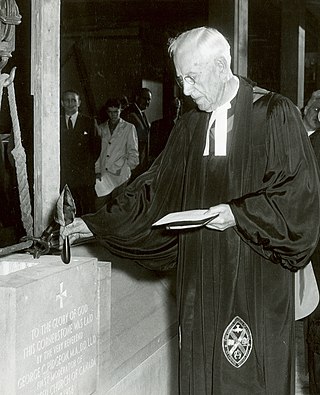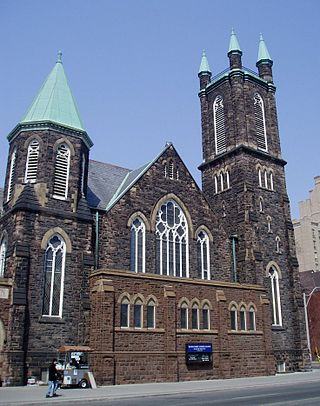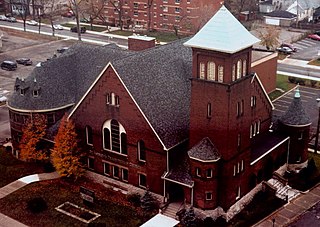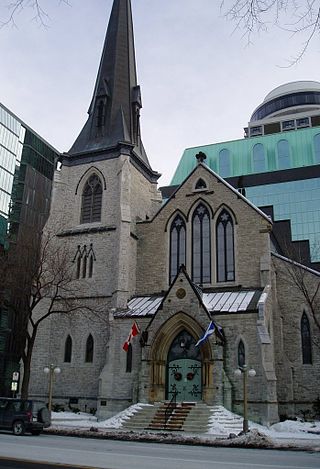
The United Church of Canada is a mainline Protestant denomination that is the largest Protestant Christian denomination in Canada and the second largest Canadian Christian denomination after the Catholic Church in Canada.

George Campbell Pidgeon was a Christian minister, first in the Presbyterian Church in Canada and then in the United Church of Canada, as well as the last Moderator of the Presbyterian Church before amalgamation and the first Moderator of the newly formed United Church of Canada. He was a strong proponent of the proposed union of churches and later in life championed ecumenism.

The Presbyterian Church in Canada is a Presbyterian denomination, serving in Canada under this name since 1875. The United Church of Canada claimed the right to the name from 1925 to 1939. According to the Canada 2001 Census 409,830 Canadians identify themselves as Presbyterian, that is, 1.4 percent of the population.

Knox Presbyterian Church is a Presbyterian Church in Ottawa, Ontario, Canada. It is named after John Knox, a founder of Presbyterianism in Scotland.

Knox College is a postgraduate theological college of the University of Toronto in Toronto, Ontario, Canada. It was founded in 1844 as part of a schism movement in the Church of Scotland following the Disruption of 1843. Knox is affiliated with the Presbyterian Church in Canada and confers doctoral degrees as a member school of the Toronto School of Theology.
Walter George Brown was a Presbyterian Church in Canada minister who opposed the formation of the United Church of Canada and was a United Reform Movement MP in the House of Commons of Canada.

St. Andrew's Church is a historic Presbyterian church located at the corner of King Street West and Simcoe Street in the city's downtown core of Toronto, Ontario, Canada. It was designed by William George Storm in the Romanesque Revival style and completed in 1876.

Bloor Street United Church is a United Church of Canada church in Toronto, Ontario, Canada. It is located on Bloor Street West in the downtown core near the intersection with Huron Street. It is just north of the University of Toronto, and between the Spadina and St. George subway stations.

Knox Presbyterian Church is a Presbyterian church in downtown Toronto, Ontario, Canada.

First Presbyterian Church is a historic Presbyterian Church in Canada congregation and Gothic Revival church building in the city's downtown core of Edmonton, Alberta, Canada. The congregation celebrated its 125th anniversary in November 2006.
St. James-Bond United Church, at 1066 Avenue Road in Toronto, Ontario, was a United Church of Canada congregation from 1928 to 2005, when it merged with Fairlawn Heights United Church in the Yonge Street and Lawrence Avenue area. The "St. James-Bond" name derived from the merger of St. James Square Presbyterian Church with Bond Street Congregational Church in 1928. Prior to the merger, they were separate congregations downtown, of the Presbyterian and Congregational traditions respectively.

St. Andrew's Presbyterian Church, is a Presbyterian Church in Canada congregation in downtown Windsor, Ontario, Canada. The congregation dates back to 1857, and at one time, was the largest congregation by membership within the Presbyterian Church in Canada (PCC).
The Free Church of Scotland is an evangelical, Calvinist denomination in Scotland. It is the continuation the original Free Church of Scotland that remained outside the union with the United Presbyterian Church of Scotland in 1900, and remains a distinct Presbyterian denomination in Scotland.

Wellington Church is a congregation and parish church of the Church of Scotland, serving part of the Hillhead area of Glasgow, Scotland. The building is located on University Avenue, Glasgow, opposite the University of Glasgow.

Deer Park United Church is the name of a United Church of Canada congregation, and also the name of this congregation's former church building at 129 St. Clair Avenue West in the Deer Park neighbourhood of Toronto, Ontario, Canada. It was one of two United Church of Canada buildings in the area and along St. Clair Avenue, the other being Timothy Eaton Memorial Church.

The Knox United Church, began as Knox Presbyterian Church in Scarborough, Toronto, Ontario, Canada, in a wood-frame church built in 1848, the result of the Church of Scotland disruption, that led to the formation of the Presbyterian Church of Canada in Connection with the Free Church of Scotland.
Marion Pardy, a diaconal minister and author, was the 37th Moderator of the United Church of Canada from 2000 to 2003.
St. Paul's Presbyterian Church is a Presbyterian congregation located in the community of Glace Bay, Nova Scotia, Canada.

The Unitarian Church in Ireland presently consists of two Congregations, Dublin and Cork, part of the Synod of Munster, in the Republic of Ireland, which has itself been part the Non-Subscribing Presbyterian Church of Ireland since 1935. Some congregations remain closely associated with the General Assembly of Unitarian and Free Christian Churches. These churches would abide by the traditional Unitarian principles of Freedom, Reason and Tolerance.
















